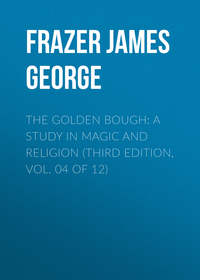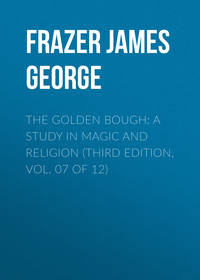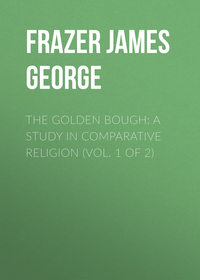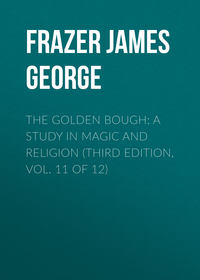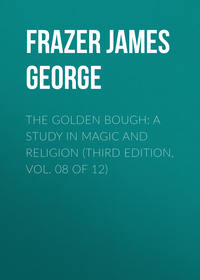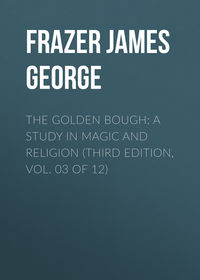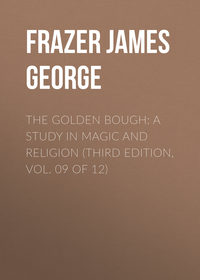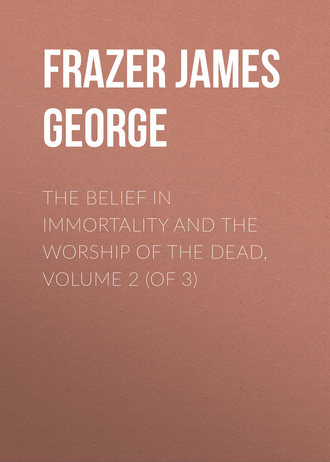
The Belief in Immortality and the Worship of the Dead, Volume 2 (of 3)
In the family, according to patriarchal usage, the father was the priest, but the priests of the national temples formed a distinct class; their office was hereditary. The high priesthood was often held by a member of the royal family, and sometimes the king himself acted as the national priest. The duties of the priests were to recite prayers, to present offerings, and to sacrifice victims. Their prayers, usually uttered in shrill, chanting tones, were often exceedingly long and full of repetitions.771 They had plenty of employment, being called in to officiate on all occasions, whether at birth or at death, at feasts or in sickness; for they were the physicians as well as the clergy of the country. They professed to possess extraordinary powers, such as to promote conception or to effect abortion, to cause or to heal disease, to pray the evil spirit into food, and even to kill men outright. Hence they were greatly feared.772 Of the little knowledge that existed in the islands the priests are reported to have possessed the largest share, but it consisted chiefly in an acquaintance with the names and ranks of the various subordinate deities (atuas); however, according to Captain Cook, they excelled the rest of the people in their knowledge of navigation and astronomy: indeed, the very name for priest (tahowa) signified nothing more than a man of knowledge.773 In the island of Huahine the priest whose duty it was to carry the image of the god Tani (Tane) "was a personage of such superhuman sanctity that everything which he touched became sacred; he was, therefore, not suffered to marry, as the honour of being his wife was too much for any mortal woman. But this was not all; he would himself be so defiled by such a connection that he would be disqualified for his office, and must immediately resign it; nay, if he did not repent, and return with a great peace-offering to Tani's house, he might expect to be first struck blind, and afterwards strangled in his sleep. He was not allowed to climb a cocoa tree, because, if he did, it would be so hallowed that nobody else durst afterwards ascend it."774
One of the most important functions of the priests was to act as mouthpieces of the gods. In the discharge of this duty they were believed to be inspired and possessed by the deity, who spoke through them to the people. When the time came for them to consult the god, they assumed an odd fantastic dress, enriched with red and black feathers, to which the deity was so partial, that when the priests approached him in this array, he descended to earth at their call in one of the sacred birds that frequented the temples (morais) and fed on the sacrifices. As soon as the bird lighted on the sacred edifice, the god left the fowl and entered into the priest. The holy man, thus inspired, now stretched himself, yawned, and rubbed his arms, legs, and body, which began to be inflated, as if the skin of the abdomen would burst; the eyes of the seer were thrown into various contortions, now staring wide, now half-shut and sinking into stupor, while at other times the whole frame was convulsed and appeared to have undergone a sudden and surprising change. The voice sank to a low pitch, and grew squeaky and broken; but at times it would suddenly rise to an astonishing height. The words uttered by the possessed man were regarded as oracular, and nothing that he asked for the god or for himself in this state was ever refused him. Of all this the priest himself affected to be entirely unaware, but a colleague was regularly at hand to record the divine message and the divine requirements, which were often very large. When the deity took his departure from the priest, he did so with such convulsions and violence as to leave the man lying motionless and exhausted on the ground, and the oracle was so timed that this happened at the very moment when the sacred bird, the vehicle of the god, flew away from the temple. On coming to himself the priest uttered a loud shriek and seemed to wake as from a profound sleep, unconscious of everything that had passed.775 Sometimes, however, the priest continued to be possessed by the deity for two or three days; at such times he wore a piece of native cloth, of a peculiar sort, round one arm as a sign of his inspiration. His acts during this period were deemed to be those of the god; hence the greatest attention was paid to his expressions and to the whole of his deportment. Indeed, so long as the fit of inspiration lasted he was called a god (atua); but when it was over, he resumed his ordinary title of priest.776
We are told that in his fine frenzy the priest "often rolled on the earth, foaming at the mouth, as if labouring under the influence of the divinity, by whom he was possessed, and, in shrill cries, and violent and often indistinct sounds, revealed the will of the god."777 It would probably be a mistake to assume that on such occasions the frantic behaviour was deliberately assumed and the wild whirling words were consciously uttered for the purpose of deceiving the people; in short, that the whole performance was a mere piece of acting, a bare-faced imposture. It is far more likely that, bred from childhood to believe in the reality of divine inspiration, the priest often sincerely imagined himself to be possessed by a deity, and that, under the excitement which such an imagination was calculated to produce, he honestly mistook his own thick-coming fancies for a revelation from the gods. A chief, who had formerly been a prophet of the god Oro, assured the missionaries "that although he sometimes feigned his fits of inspiration, to deceive the credulous multitude, yet, at other times, they came upon him involuntarily and irresistibly. Something seemed to rush through his whole frame, and overpower his spirit, in a manner which he could not describe. Then he frothed at the mouth, gnashed his teeth, and distorted his limbs with such violence that it required five or six strong men to hold him. At these times his words were deemed oracles, and whatever he advised respecting state affairs, or other matters, was implicitly observed by king and chiefs."778 Thus on the ravings of these crazy fanatics or deliberate impostors often hung the issues of life or death, of war or peace.779 It appears to have been especially the priests of Oro who laid claim to inspiration and contrived to shape the destinies of their country through the powerful sway which they exercised over the mind of the king. In their fits of fanatical frenzy, while they delivered their oracles, they insisted on the sovereign's implicit compliance with their mandates, denouncing the most dreadful judgments on him if he should prove refractory.780
Apart from the priests there was a class of men whose business it was to preserve and hand down to their successors the lists of the gods, the liturgical prayers, and the sacred traditions. As these liturgies and legends were often very lengthy and couched in a metaphorical and obscure language, a prodigious memory and long practice were indispensable for their preservation and transmission among a people to whom the art of writing was unknown. Since the slightest mistake in the recitation of a liturgy was deemed the worst of omens and necessitated the suspension of the religious service, however costly and important the service might be, the sacred recorders, as we may call them, were obliged, for the sake of their credit, to practise continually the recitation of the prayers, legends, and traditions of which they were the depositories. To aid them in their task they made use of bundles of little sticks of different sizes, one of which they drew from a bundle at the conclusion of each prayer. It was their duty on solemn occasions to recite these liturgies or sacred poems while they paced slowly by night round the temples (morais) and other holy places; hence they went by the name of harepo, which means "Walkers by night." We are told that if at these times they made a mistake in a single word or hesitated for a moment, they stopped and returned home; and if the subject of their prayers chanced to be some enterprise in which they desired to enlist the favour of the gods, such a mistake or hesitation was enough to cause the undertaking to be abandoned irretrievably, since success in it was believed to be impossible. Nothing, it is said, could be more astonishing than the memory displayed by these men, while they recited, word for word, and for nights together, the ancient traditions of which the mutilated and mangled remains would demand the assiduous study of several years. The office of sacred recorder (harepo) was hereditary in the male line; the sons were trained in the duties from their earliest years, but only such as were endowed with an excellent memory could satisfy the requirements of the profession. They believed that a good memory was a gift of the gods.781
§ 6. The Doctrine of the Human Soul
Of the Society Islanders we are informed that "they believe every man to have a separate being within him, named tee, which acts in consequence of the impression of the senses, and combines ideas into thoughts. This being, which we would call the soul, exists after death, and lodges in the wooden images which are placed round the burying-places, and which are called by the same name, tee."782 When they were asked in what part of the body the soul resides, they always answered that it was seated in the belly or in the bowels (I roto té obou). They would not admit that the brain could be the seat of thought or the heart of the affections; and in support of their opinion they alleged the agitation of the bowels in strong emotion, such as fear and desire.783 Hence, too, they called thoughts by a phrase which signifies "words in the belly" (parou no te oboo).784
But the Society Islanders did not regard the possession of a soul as a privilege peculiar to humanity. According to Captain Cook, "they maintain that not only all other animals, but trees, fruit, and even stones, have souls, which at death, or upon being consumed or broken, ascend to the divinity, with whom they first mix, and afterwards pass into the mansion allotted to each."785 Their word for soul was varoua, according to Moerenhout, who adds that, "It appears that they accorded this varoua (spirit, soul) not only to man, but even in addition to the animals, to plants, to everything that vegetates, grows or moves on the earth."786
They thought that the soul of man could be separated for a time from the body during life without causing immediate death. Thus, like many other peoples, they explained dreams by the supposed absence of the soul during slumber. We are told that "they put great confidence in dreams, and suppose in sleep the soul leaves the body under the care of the guardian angel, and moves at large through the regions of spirits. Thus they say, My soul was such a night in such a place, and saw such a spirit. When a person dies, they say his soul is fled away, hārre pō, gone to night."787 But they also believed that a man's soul or spirit could be conjured out of his body by magic art or demoniacal agency. Thus, when people had been robbed, they would sometimes call in the help of a priest to ascertain the thief. In such a case the priest, after offering prayers to his demon, would direct them to dig a hole in the floor of the house and to fill it with water; then, taking a young plantain in his hand, he would stand over the hole and pray to the god, whom he invoked, and who, if he were propitious, was supposed to conduct the spirit of the thief to the house and to place it over the water. The image of the spirit, which they believed to resemble the person of the man, was, according to their account, reflected in the water and perceived by the priest, who was thus able to identify the thief, alleging that the god had shown him the reflection of the culprit in the water.788 From this it appears that in the opinion of the Society Islanders, as of many other peoples, a man's soul or spirit is a faithful image of his body.789
They believed that in the pangs of death the soul keeps fluttering about the lips, and that, when all is over, it ascends and mixes with or, as they expressed it, is eaten by the deity.790 When one of their sacred recorders (harepo), who had been famous in his life for his knowledge of the ancient traditions, was at the point of death, it was customary for his son and successor to place his mouth over the mouth of the dying man, as if to inhale the parting soul at the moment of quitting the body; for in this way he was supposed to inherit the lore of his father. The natives, it is said, were convinced that these sages owed their learning to this expedient, though none the less they studied day and night to perfect themselves in their profession.791
§ 7. Disease, Death, and Mourning
Every disease was supposed to be the result of direct supernatural agency, and to be inflicted by the gods for some crime committed against the law of taboo of which the sufferer had been guilty; or it might have been brought upon him by an enemy, who had compassed his destruction by means of an offering. They explained death in like manner: according to them, it was invariably caused by the direct influence of the gods.792 They acknowledged, indeed, that they possessed poisons which, taken with food, produced convulsions and death, but these effects they traced to the anger of the gods, who employed the drugs as their material agents or secondary causes. Even when a man was killed in battle, they still saw in his death the hand of a god, who had actually entered into the weapon that inflicted the fatal blow.793
The gods who were thus supposed to afflict human life with sickness and disease and to bring it to an untimely termination in death were not always nor perhaps usually the high primaeval deities; often they were the souls of the dead, who ranked among the domestic divinities (oromatuas). And, like the Maoris,794 the natives of the Society Islands are said to have stood in particular fear of the souls of dead infants, who, angered at their mother for their too early death, took their revenge by sending sickness on the surviving members of the family. Hence when a woman was ill-treated by her husband, she would often threaten to insult the ghost of a dead baby; and this threat, with the deplorable consequences which it was calculated to entail, seldom failed to bring the husband to a better frame of mind; or if he happened to prove recalcitrant, the other members of the family, who might be involved in the calamity, would intercede and restore peace in the household. Thus we are told that among these islanders the fear of the dead supplied in some measure the place of natural affection and tenderness in softening and humanising the general manners.795
Disease and death were also attributed to the malignant charms of sorcerers, who, hired by an enemy of the sufferer, procured for the purpose the clipped hair or the spittle of their intended victim, the flowers or garment he had worn, or any object which had touched his person. But the real agents who were thought to give effect to the charms were the minor deities, whom the sorcerer employed to accomplish his nefarious ends. For this purpose he put the hair or other personal refuse of the victim in a bag along with the images and symbols of the petty divinities, and buried the bag and its contents in a hole which he had dug in the ground. There he left it until, applying his ear to the hole, he could hear the soul of the sufferer whimpering down below, which proved that the charm was taking effect. If the intended victim got wind of these machinations, it was always in his power to render them abortive, either by sacrificing to the gods or by sending a present to the sorcerer, who thus was feed by both sides at the same time.796
However, most cases of sickness apparently were set down not to the wiles of sorcerers, but to the displeasure of the deified spirits of the dead.797 On this point the evidence of the early missionaries is explicit. Speaking of the Society Islanders, they say that "they regard the spirits of their ancestors, male and female, as exalted into eatooas [atuas, deities], and their favour to be secured by prayers and offerings. Every sickness and untoward accident they esteem as the hand of judgment for some offence committed; and therefore, if they have injured any person, they send their peace-offering, and make the matter up: and if sick, send for the priest to offer up prayers and sacrifices to pacify the offended eatooa; giving anything the priests ask, as being very reluctant to die."798 "As it is their fixed opinion, that no disease affects them but as a punishment inflicted by their eatooa [atua] for some offence, and never brought on themselves by intemperance or imprudence, they trust more to the prayers of their priests than to any medicine."799
They imagined that at death the soul (varua) was drawn out of the head by a god or spirit (atua) as a sword is drawn out of its scabbard, and that the spirits of the dead often waited to catch it at the moment when it issued from the body. Sometimes the dying man would fancy that he saw the spirits lurking for him at the foot of the bed, and would cry out in terror, "They are waiting for my spirit. Guard it! Preserve it from them!"800
When the last struggle was over, a priest or diviner (tahua tutera) was called in to ascertain the cause of death. For this purpose he entered his canoe and paddled slowly along on the sea, near the house in which the dead body was lying, in order to watch the passage of the departing spirit; for they thought that it would fly towards him with the emblem of the cause through which the person had died. If he had been cursed by the gods, the spirit would appear with a flame, fire being the agent employed in the incantations of the sorcerers, who had presumably drawn down the curse upon the deceased. If some enemy had bribed the gods to kill him, the spirit would come with a red feather, as a sign that evil spirits had entered into his food. After a short time the diviner returned to the house, announced the cause of death to the survivors, and received his fee, the amount of which was regulated by the circumstances of the family. After that a priest was employed to perform ceremonies and recite prayers for the purpose of averting destruction from the surviving members of the family; but the nature of the ceremonies has not been recorded.801
When it was manifest that death was approaching, the relatives and friends, who had gathered round the sufferer, broke into loud lamentations and other demonstrations of sorrow, which redoubled in violence as soon as the spirit had departed. Then they not only wailed in the loudest and most affecting tone, but tore out their hair, rent their garments, and cut themselves with shark's teeth or knives in a shocking manner. The instrument usually employed was a small cane, about four inches long, with five or six teeth fixed into it on opposite sides. Struck forcibly into the head, these instruments wounded it like a lancet, so that the blood poured down in copious streams. Every woman at marriage provided herself with one of these implements and used it unsparingly on herself on the occasion of a death in the family. Some people, not content with this instrument of torture, provided themselves with a sort of mallet armed with two or three rows of shark's teeth; and with this formidable weapon, on the demise of a relative or friend, they hammered themselves unmercifully, striking their skulls, temples, cheeks, and breast, till the blood flowed profusely from the wounds. At the same time they uttered the most deafening and agonising cries; and what with their frantic gestures, the distortion of their countenances, their torn and dishevelled hair, and the mingled tears and blood that trickled down their bodies, they presented altogether a horrible spectacle. This self-inflicted cruelty was practised chiefly by women, but not by them alone; for the men on these occasions committed the like enormities, and not only cut themselves, but came armed with clubs and other deadly weapons, which they sometimes plied freely on the bodies of other people. These dismal scenes began with the nearest relatives of the deceased, but they were not confined to them. No sooner did the tidings spread, and the sound of wailing was heard throughout the neighbourhood, than friends and kinsfolk flocked to the spot and joined in the demonstrations of real or affected sorrow. The pageant of woe reached its climax when the deceased was a king or a principal chief. It was then, above all, that the tenants and retainers came armed with bludgeons and stones, with which they fought each other till some of them were wounded or slain; while others operated on themselves by tearing their hair and lacerating their bodies in the usual manner till their bodies were bedabbled with blood. After the introduction of firearms into the islands, these lethal weapons lent variety and noise to the combats, as well as adding to the number of the slain. At the death of a person of distinction these exhibitions of frenzied sorrow sometimes lasted two or three days in succession, or even longer.802 On such occasions a body of armed men, composed of friends and allies, used to arrive from a neighbouring district and request to be allowed access to the body of the chief, in order that they might mourn for him in due form. The request was always refused by the bodyguards, who kept the last vigil over their departed lord; and in consequence a fight ensued in which several warriors were generally wounded or killed. Yet it was only a sham fight, which seems to have always ended in a victory for the mourners who had come from a distance; and when it was over, victors and vanquished regularly united in performing the usual sanguinary rites of mourning. In all the islands wrestling matches, combats, and assaults-at-arms were ordinary features of the obsequies of chiefs.803
The blood which women in the paroxysms of grief drew from their bodies, and the tears which flowed from their eyes, were received on pieces of cloth, which were then thrown upon or under the bier as oblations to the dead.804 Sometimes for this purpose a woman would wear a short apron, which she held up with one hand, while she cut herself with the other, till the apron was soaked in blood. Afterwards she would dry it in the sun and present it to the bereaved family, who kept it as a token of the estimation in which the departed had been held.805 Some of the younger mourners used also to cut off their hair and throw it under the bier with the other offerings.806 When the deceased was a child, the parents, in addition to other tokens of grief, used to cut their hair short on one part of their heads, leaving the rest long; sometimes they shaved a square patch on the forehead; sometimes they left the hair on the forehead and cut off all the rest; at other times they removed all the hair but a lock over one or both ears; or again they would clip close one half of the head, while on the other half the tresses were suffered to grow long; and these signs of mourning might be continued for two or three years.807
Captain Cook tells us that the custom observed by mourners of offering their own blood, tears, and hair to their departed relative or friend "is founded upon a notion that the soul of the deceased, which they believe to exist in a separate state, is hovering about the place where the body is deposited: that it observes the actions of the survivors, and is gratified by such testimonies of their affection and grief."808 This explanation, in perfect harmony with the vigilance, vanity, and jealousy commonly ascribed to ghosts, is in all probability correct. Yet it deserves to be noticed that the custom of voluntarily hacking the body with shark's teeth to the effusion of blood was singularly enough practised by the Society Islanders on occasions of joy as well as of sorrow. When a husband or a son returned to his family after a season of absence or exposure to danger, his arrival was greeted, not only with the cordial welcome and the warm embrace, but with loud wailing, while the happy wife or mother cut her body with shark's teeth, and the gladder she was the more she gashed herself.809 Similarly many savage peoples weep over long-absent friends, or even over strangers, as a polite form of greeting in which genuine sorrow can hardly be supposed to play a part.810 It is difficult to see how such observances can be based on superstition; apparently the emotion of joy may express itself in very different ways in different races.


